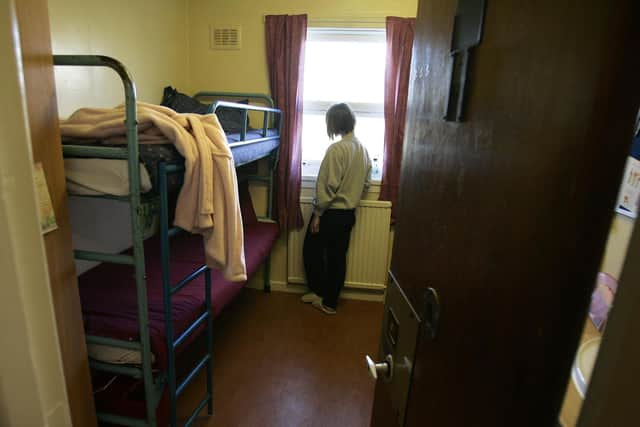How Scotland's prison service is coping with emerging from Covid - Ash Denham
I was grateful to be the first minister to visit prison facilities since the initial lockdown of March 2020.
I visited Cornton Vale and Polmont prisons to meet women, discover more about the steps being taken in our prisons to recover from the pandemic and to view progress being made on a new bespoke facility at Cornton Vale.


Advertisement
Hide AdAdvertisement
Hide AdI was also invited to see innovative plans for a new Community Custody Unit in Dundee, which will help women transition from life in the prison back into the community.
During the visits I was heartened to see the level of respect that exists between staff and women, and was able to thank prison service and NHS staff who have worked tirelessly despite the challenges and pressures thrown up by the Covid-19 period.
And, like inspectors, I was also impressed by the care and compassion demonstrated by staff, and the efforts made to engage women in activities, during my visit.
At Polmont, I met with women who have been learning about hairdressing – providing a range of benefits and vocational skills. I also spent more than two hours at Cornton Vale on August 26 learning about women and their stories – and hearing how they are looking forward to the new facilities being built there being completed.


They have all been really positive experiences.
And that’s something not just evident at these two prisons, but across the whole of the Scottish prison estate, where the positivity and response of staff and co-operation by those in care has ensured stability during an incredibly challenging time.
Our prison services are at a pivotal point in the pandemic, and these visits gave me the opportunity to see how rehabilitation programmes are once again being resumed.
These are vital and fulfil a key role in reducing reoffending – namely to help and support those that they care for – preparing them for life afterwards.
We are all following a cautious route map out of pandemic and, consistent with the wider community, transition back to a rehabilitative regime across the estate is critical.
Advertisement
Hide AdAdvertisement
Hide AdCoupled with this, vigilance will, of course, remain key – and we are likely to see precautionary measures in place for some time in prison settings.
For many in our prisons, maintaining contact with loved ones has remained crucial. Access to mobile phone handsets for people and virtual visits – facilitated by the Scottish Government – will remain in place for the duration of the pandemic.
In Cornton Vale and Polmont, this innovation is particularly important to women and young people when it comes to maintaining the sort of ties and support structures needed to help people integrate back into society and ultimately thrive as part of it.
The resounding success of our domestic vaccine roll out has enabled greater freedoms. As the number of fully vaccinated people increases within the prison estate, alongside testing, we can expect to see prison life transitioning to be more like it was before lockdown.
I was particularly impressed with the progress I saw in the replacement of Cornton Vale.
The new Women’s National Facility will provide a dedicated environment for the care of women and is a key example of our commitment to modernising and improving Scotland’s prison estate.
The Community Custody model I heard about in Dundee will provide women with essential support to address need close to their communities.
The buildings are central, providing environments that do not feel institutional or threatening and promote independent living. Just as important, however, is the quality of the relationships established within all establishments, the skills and knowledge of staff and the services and tools that will be available there to help to address the individual needs of the women.
Advertisement
Hide AdAdvertisement
Hide AdAlongside the new custodial facilities, the prison service has been developing a strategy for working with women in custody.
This sets out plans for practice, tools and services that are trauma informed, matched to the specific needs and characteristics of women in custody, and support to improve women’s mental and physical health and wellbeing and recovery from addictions.
The circumstances surrounding a women entering custody can be very different from men and any response, to be effective, must recognise those differences.
Often women in custody have suffered significant trauma at various stages in their lives and are very likely to have been victims as well, with many having experienced emotional, physical or sexual abuse during their childhood. It is important to recognise that women react and deal with trauma and emotionally challenging situations differently from men.
A specific offending behaviour programme for women has been developed and a new daily regime designed for the Women’s National Facility to optimise the time available for women to participate in activities to develop their skills and agency.
Professional training programmes for staff are under development and collaborative arrangements are being developed with partners including NHS, local authorities and third sector organisations to design and deliver the appropriate range of services.
The facilities and ways of working will take account of the specific requirements and needs of women in custody and also, where appropriate, locate women closer to their communities and local services.
A key concern is to seek to minimise the damaging effects of exclusion and, where possible, to maintain and strengthen family bonds, which have been proven to be important in supporting women in their return to their communities.
Advertisement
Hide AdAdvertisement
Hide AdUltimately, as minister for community safety, I was struck by the level of support prison staff have in place for the women they are looking after and the reciprocal acceptance of that.
There is a sense of respect, hard work and goodwill strongly evident in the prison estate and that is testimony to a collective effort I am extremely impressed by.
- Ash Denham is the Scottish minister for community safety
